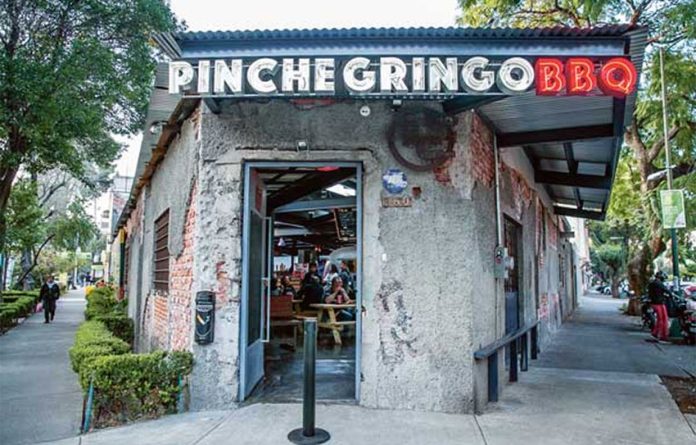Mexico City restaurant chain Pinche Gringo BBQ has won a long legal battle over the morality of its name.
Article 4 of the Industrial Property Law stipulates that a brand cannot be registered if it is deemed to be contrary to the morals and good manners of society.
The word pinche means “damn” in colloquial Mexican Spanish although it can also be translated as a far more offensive term, depending on how it is used. Accordingly, the Mexican Institute of Industrial Property (IMPI) refused to register the name.
But the Pinche Gringo BBQ owners, United States native Dan DeFossey and Mexican Roberto Luna, launched a legal challenge against the decision and more than five years later have won the right to register the name.
“. . . The case reached a collegiate district court and our main argument was that the fourth article of the law is against the constitution because IMPI must not be the arbitrator of morals and good manners,” said lawyer Luz Elena Elías, who represented Pinche Gringo.

“In the end, the court ruled in our favor,” she said, adding that the decision sets a precedent for the use of the word pinche in a brand.
Another argument used by the restaurant’s lawyers was that pinche actually means “kitchen assistant” in formal Spanish.
“From a gastronomic point of view, the word pinche refers to a cook . . .” lawyer Alejandro Luna de Olivares told the magazine Forbes México.
In addition, lawyers argued that pinche in the context it is used by the restaurant chain aims to generate fraternity and camaraderie between citizens of the United States and Mexico. DeFossey has said that a goal of Pinche Gringo BBQ is “to be a cultural center where we offer a variety of activities and a bridge between Mexico and the United States.”
He told Forbes that he suggested the name of the restaurant to Luna as a kind of “joke,” adding that the relationship between gringos and Mexicans has historically been muy pinche (very bad).
DeFossey celebrated the court’s recent ruling, explaining that “from now on we can register our brand for other products related to our business.”
One idea is to sell salsas under the Pinche Gringo brand, he said.
The original Pinche Gringo BBQ restaurant opened in the Mexico City neighborhood of Navarte six years ago, and a second location in Anáhuac followed. Both restaurants serve Texas-style barbecue and traditional American sides year-round and also host Fourth of July, Super Bowl and United States election parties, among other events.
Among the more than 100 employees are a number of Mexicans who were deported from the United States after living much of their lives north of the border.
DeFossey told Forbes in August that a third Pinche Gringo restaurant is in the works.
“The future is very bright. We have a lot of ideas to grow Pinche Gringo. We have plans to open a luxury restaurant with . . . more gourmet food but with a casual atmosphere,” he said.
Source: Reforma (sp), Forbes México (sp)
